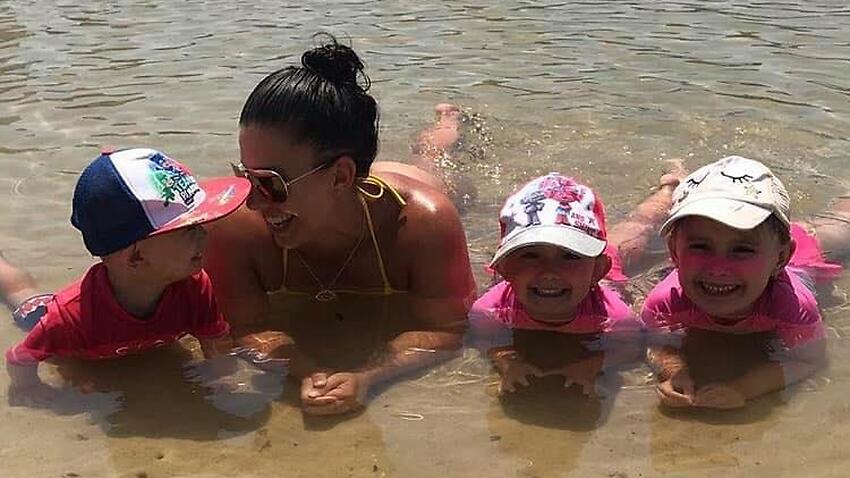This article contains references to domestic and family violence.
Australians have joined the parents of murdered mother-of-three Hannah Clarke in lighting a candle to honour their daughter, one year on from her death.
Hannah and her three children, six-year-old Aaliyah, four-year-old Laianah and three-year-old Trey, were murdered by her estranged husband in Brisbane last February.
Parents Sue and Lloyd Clarke went on to set up a foundation in their legacy – Small Steps 4 Hannah – that aims to educate the community on domestic violence and push for legal reform.
“Our family and friends have been through some pretty dark times in the last 12 months,” Sue and Lloyd said in a video posted on the foundation’s Facebook page on Friday.
“We’re going to remember them as bright, happy people who brought light to everyone they met.”
Monuments were lit up around Brisbane on Friday ahead of an evening vigil, with Hannah’s parents also asking the community to light a candle in their memory at 5:30pm (local time) and post a photo on social media.
“As the sun goes down, we invite you to light a candle for them, and for all victims of domestic and family violence,” Lloyd said.
“Let’s keep the flame burning, until there is no darkness,” Sue added.
Pictures began to flood Facebook and Twitter on Friday evening accompanied by the hashtag #HALT – an acronym for Hannah, Aaliyah, Laianah and Trey.
Shannon Fentiman, Queensland Attorney-General and Minister for the Prevention of Domestic and Family Violence, was among those to post a photo, saying domestic and family violence “has no place in our community”.
“Tonight, we pause to remember Hannah Clarke and her three children, Aaliyah, Laianah, and Trey and light a candle for them, and victims of domestic and family violence,” she wrote on Twitter.
“We can change. And we must change.”
There had been earlier concerns the tribute would not be able to proceed on the foundation’s Facebook page after it was caught up in the platform’s Australian news ban.
Small Steps 4 Hannah was among the non-media organisations on Facebook – including critical health, weather and domestic violence services – that were hit by the ban for at least part of Thursday.
“It’s very upsetting. It’s very, very disappointing,” Sue told reporters on Thursday.
The page was restored later on Thursday night.
In Canberra on Thursday, Prime Minister Scott Morrison remembered Hannah and her children and the “unspeakable, unthinkable” crime that ended their lives.
“We must do all we can to support those suffering from family violence. Hannah we … thank you and we will never forget,” Mr Morrison told parliament.
Federal Labor leader Anthony Albanese added: “We cannot be bystanders, not now, not ever. Let us be guided every day by their memory and let them never fade.”
Calls to criminalise coercive control
Sue and Lloyd Clarke are part of a push to criminalise coercive control in domestic relationships.
There are growing calls to make intimidation, stalking and other forms of coercive control illegal under reforms to domestic violence laws across Australia, with federal politicians, families of victims and journalists joining a campaign urging states and territories to outlaw it.
The term ‘coercive control’ is used to describe a deliberate pattern of abuse occurring within intimate relationships. It can include emotional and psychological manipulation, along with social, financial and technology-facilitated abuse.
It is the most common risk factor in the lead up to a domestic violence homicide, according to Women’s Legal Service NSW.
A review carried out from 2017-2019 by the NSW Coroner’s Court found 99 per cent of intimate partner homicides were preceded by “coercive and controlling behaviours towards the victim”.
The Queensland government this week announced it would set up an independent task force to investigate the implementation of coercive control legislation.
Tasmania is so far the only state which has already implemented laws dealing directly with controlling behaviour.
New South Wales, Victoria, South Australia and the Northern Territory are considering similar laws after campaigning from women’s safety organisations.
“We need to make sure that our understanding of domestic abuse is enshrined in law and then that can filter right throughout the community,” Hayley Foster, CEO of Women’s Safety, told SBS News.
But while experts agree coercive control needs to be urgently acknowledged and understood, some say Australia’s criminal justice system is not ready to introduce a standalone offence – and doing so could risk more harm to marginalised communities.
Additional reporting by Jennifer Scherer and AAP.
If you or someone you know is impacted by sexual assault, family or domestic violence, call 1800RESPECT on 1800 737 732 or visit 1800RESPECT.org.au. In an emergency, call 000.
You may have noticed SBS News is no longer available on Facebook. Here’s where else you can find our content and follow us:
SBS News website: Save our website sbs.com.au/news as a favourite.
SBS News app: Download our app from Apple’s App Store or Google Play and subscribe to the alerts.
Apple News: Follow the SBS News channel here on an Apple device.
Twitter: Follow us at twitter.com/SBSNews
Instagram: Follow us at instagram.com/sbsnews_au
YouTube: Subscribe at youtube.com/c/sbsnews
TikTok: Follow us at tiktok.com/@sbsnews_au
Reddit: Follow us at u/SBSNews_au







